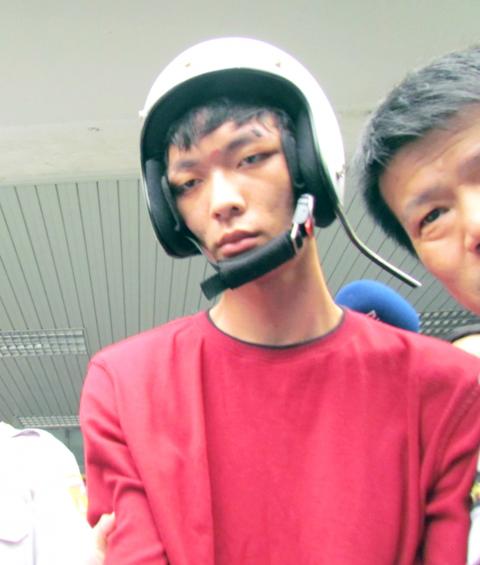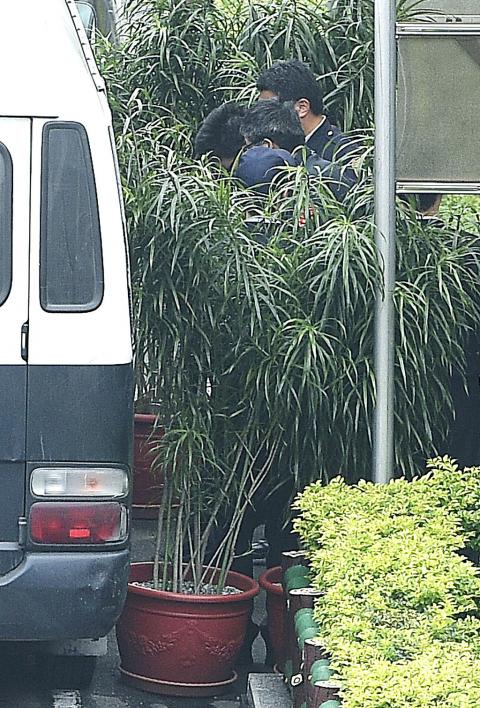The New Taipei City District Court collegiate bench yesterday found MRT killer Cheng Chieh (鄭捷) guilty on four counts of murder and 22 counts of attempted manslaughter, handing down four death sentences and prison sentences ranging from five to eight years, amounting to a total jail term of 144 years.
Cheng’s citizen’s rights have also been revoked for life.
The ruling may be appealed, the court said.

Photo: CNA
Cheng, then a student of Tunghai University, attacked passengers on Taipei’s MRT metro rail system on May 21 last year on the Bannan Line between Longshan Temple Station and Jiangzicui Station. He killed Hsieh Ching-yun (解青雲), Chang Cheng-han (張正翰), Lee Tsui-yun (李翠雲) and Pan Pi-chu (潘碧珠), and injured 22 others.
Cheng had initially said that he was tired of life, but was afraid of committing suicide, so he committed multiple counts of murder so that he would be assured of capital punishment.
The court found that Cheng did not exhibit signs of psychotic abnormalities or mental deficiencies at the time of his actions.

Photo: Chen Chih-chu, Taipei Times
Central Police University professor Shen Sheng-ang (沈勝昂) said the possibility of Cheng being rehabilitated was unlikely, adding that “Cheng’s situation is akin to that of a terminal-stage cancer patient.”
Cheng’s initial aloofness and silence, as well as his failure to apologize to the victims’ families, saw an abrupt turn on Feb. 10, when he broke his silence to say he would undergo psychiatric consultation and would not resort to violence and murder again if given the chance for parole.
According to sources, Cheng’s sudden change in attitude was due to his belief that he could accept a life sentence and perhaps make a living by starting a small business if he were to be released on parole.
One source quoted Cheng saying to his friends that “[If I] win [the case], we’ll have the chance of living our lives as we like; [if I] lose, we’ll meet in another life as heroes.”
Cheng’s lawyers sought to rationalize his attitude after the killings by saying that his thinking was like that of a teenager, believing that if he showed any regret, he would lose face.
That is why he seemed aloof, although he knew what he did was wrong, they said.
“We understand that the court is under great pressure from the media, but trying to demonize the defendant will not help society,” Cheng’s lawyers said in a statement.
His lawyers also criticized the presiding judges, saying that the court violated their client’s rights by forcing him to attend court to hear the ruling, as he was not by law mandated to be present.
“By forcing our client to appear at court simply for maximum media effect, the judges have lost focus and have endangered the equality and uniformity of the law, creating an exception that might be followed in future cases,” the lawyers said.
Meanwhile, family members of the victims said that the ruling was in accordance with the public’s expectations, but they could not condone the comments from Cheng’s lawyers.
Lee’s brother Lee Jui-chang (李瑞昌) said he was glad the New Taipei City District Court judges were just, and that he hoped judges in the appellate courts would continue to uphold the ruling.
The reasons cited by the lawyers for the murders sought to deny Cheng’s responsibility in the matter, Lee Jui-chang said, adding that he hoped the day for the final ruling on Cheng’s capital punishment could be expedited.
Additional reporting by CNA

SECURITY: As China is ‘reshaping’ Hong Kong’s population, Taiwan must raise the eligibility threshold for applications from Hong Kongers, Chiu Chui-cheng said When Hong Kong and Macau citizens apply for residency in Taiwan, it would be under a new category that includes a “national security observation period,” Mainland Affairs Council (MAC) Minister Chiu Chui-cheng (邱垂正) said yesterday. President William Lai (賴清德) on March 13 announced 17 strategies to counter China’s aggression toward Taiwan, including incorporating national security considerations into the review process for residency applications from Hong Kong and Macau citizens. The situation in Hong Kong is constantly changing, Chiu said to media yesterday on the sidelines of the Taipei Technology Run hosted by the Taipei Neihu Technology Park Development Association. With

A US Marine Corps regiment equipped with Naval Strike Missiles (NSM) is set to participate in the upcoming Balikatan 25 exercise in the Luzon Strait, marking the system’s first-ever deployment in the Philippines. US and Philippine officials have separately confirmed that the Navy Marine Expeditionary Ship Interdiction System (NMESIS) — the mobile launch platform for the Naval Strike Missile — would take part in the joint exercise. The missiles are being deployed to “a strategic first island chain chokepoint” in the waters between Taiwan proper and the Philippines, US-based Naval News reported. “The Luzon Strait and Bashi Channel represent a critical access

CARROT AND STICK: While unrelenting in its military threats, China attracted nearly 40,000 Taiwanese to over 400 business events last year Nearly 40,000 Taiwanese last year joined industry events in China, such as conferences and trade fairs, supported by the Chinese government, a study showed yesterday, as Beijing ramps up a charm offensive toward Taipei alongside military pressure. China has long taken a carrot-and-stick approach to Taiwan, threatening it with the prospect of military action while reaching out to those it believes are amenable to Beijing’s point of view. Taiwanese security officials are wary of what they see as Beijing’s influence campaigns to sway public opinion after Taipei and Beijing gradually resumed travel links halted by the COVID-19 pandemic, but the scale of

Pope Francis is be laid to rest on Saturday after lying in state for three days in St Peter’s Basilica, where the faithful are expected to flock to pay their respects to history’s first Latin American pontiff. The cardinals met yesterday in the Vatican’s synod hall to chart the next steps before a conclave begins to choose Francis’ successor, as condolences poured in from around the world. According to current norms, the conclave must begin between May 5 and 10. The cardinals set the funeral for Saturday at 10am in St Peter’s Square, to be celebrated by the dean of the College